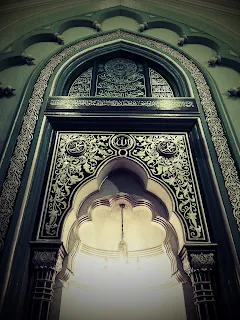Insha-Allah,
in a few days (either next Tuesday the 7th
of May or Wednesday the 8th
of May), we will observe the month of fasting of Ramadan.
The
month of Ramadan does not only mean fasting. The ultimate goal is to
attain piety as mentioned in the Holy Qur’an. So, it is up to us to
make sure to increase our Taqwa
and get closer to the Creator during this blessed month. All Muslims
must devote more time to acts of worship (Ibadat)
such as: Zikr-i-Ilahi
(remembrance of Allah through meditation), and Tilawat-i-Quran
(reading the Holy Quran).
 Do
not waste time in the kitchen to prepare several cakes and other
foods and therefore letting a precious time go to waste. You should
instead use this time to connect to Allah in the mandatory and
supererogatory prayers. There are good numbers of Muslims who prepare
“Iftaar parties”
and thus do not really know the philosophy of fasting Ramadan. A
crazy time is lost in the preparation of dishes of all kinds, and
this concerns not only women but also men. They invite a large number
of people to Iftaar
as if this sacred moment is a feast, a moment of enjoyment that is
far from the spirit of Ramadan!
Do
not waste time in the kitchen to prepare several cakes and other
foods and therefore letting a precious time go to waste. You should
instead use this time to connect to Allah in the mandatory and
supererogatory prayers. There are good numbers of Muslims who prepare
“Iftaar parties”
and thus do not really know the philosophy of fasting Ramadan. A
crazy time is lost in the preparation of dishes of all kinds, and
this concerns not only women but also men. They invite a large number
of people to Iftaar
as if this sacred moment is a feast, a moment of enjoyment that is
far from the spirit of Ramadan!
It
is true that Hazrat Muhammad (pbuh) had advised Muslims to share
Iftaar
with a faster, but one should not go beyond limits, losing time by
preparing great kinds and large quantity of food, and foregoing the
time of prayer etc.
What
are Iftaar
Parties? It is rather an innovation because the philosophy behind the
fast of Ramadan is that we must devote ourselves more and more in the
spiritual field by making sacrifices for the pleasure of Allah (twa).
Muslims are called by divine order to fast for the pleasure of Allah,
and to make certain sacrifices that will make them feel a closeness
to Allah and also to all of humanity, especially the poor.
Take Care of Your Physical & Spiritual Health
Ramadan
is a sacred month, and it has a great importance in the lives of all
Muslims, without exception. Wake up a little earlier than usual,
before the Sehri /
Suhur, and enjoy
supererogatory prayers such as Salat-ul-Tahajjud
and remember Allah a lot. Even for the elderly who cannot fast or who
are sick and who must take medication, they are advised not to take
any risks. But they (those who cannot fast) should not forget to pay
Fidya.
And the elderly must benefit more in this blessed month in terms of
doing Tawba
which is also an act through which one gets closer to Allah. Even if
you do not fast, then you should maximize this blessed month in the
obligatory and supererogatory prayers, the Zikr,
the Tilawat-i-Quran
and if you cannot read Arabic, then you can also read them in your
own language, and also recite the Darood
Shariff.








